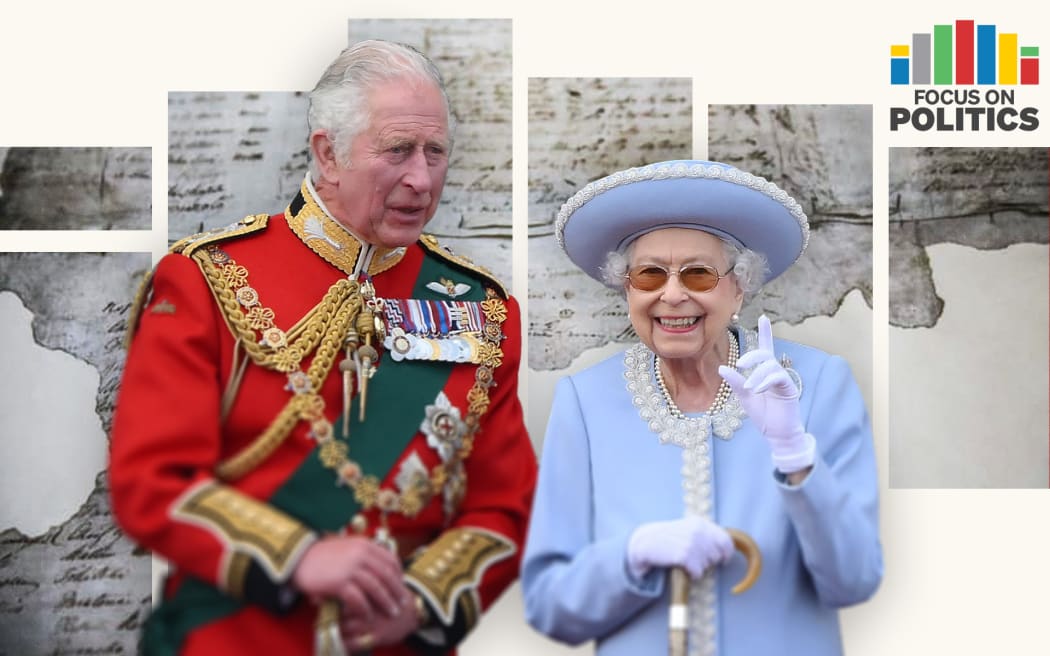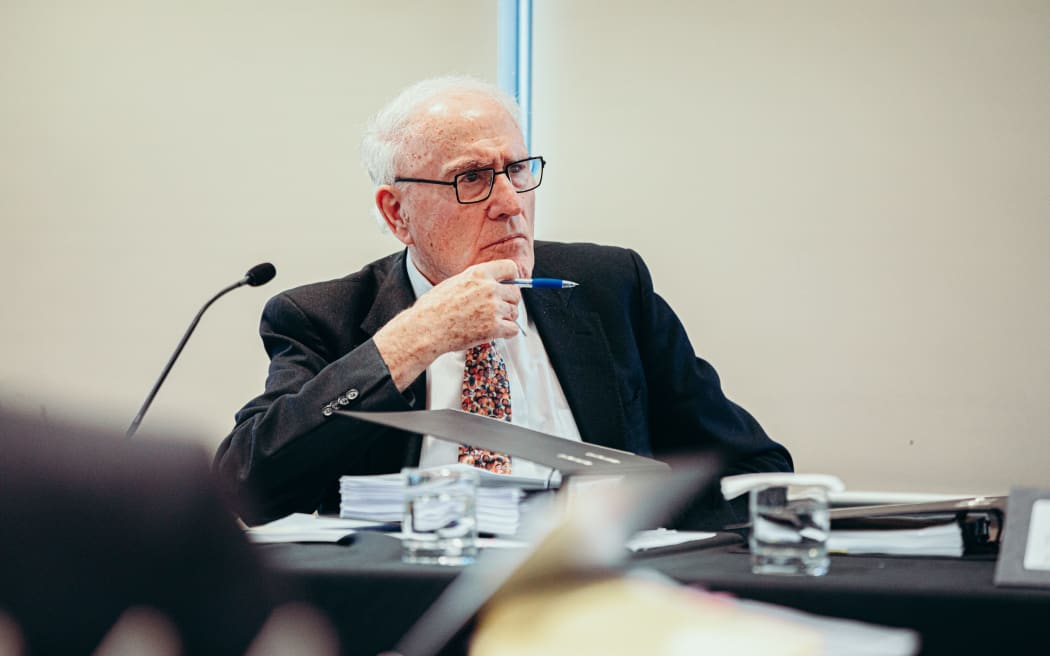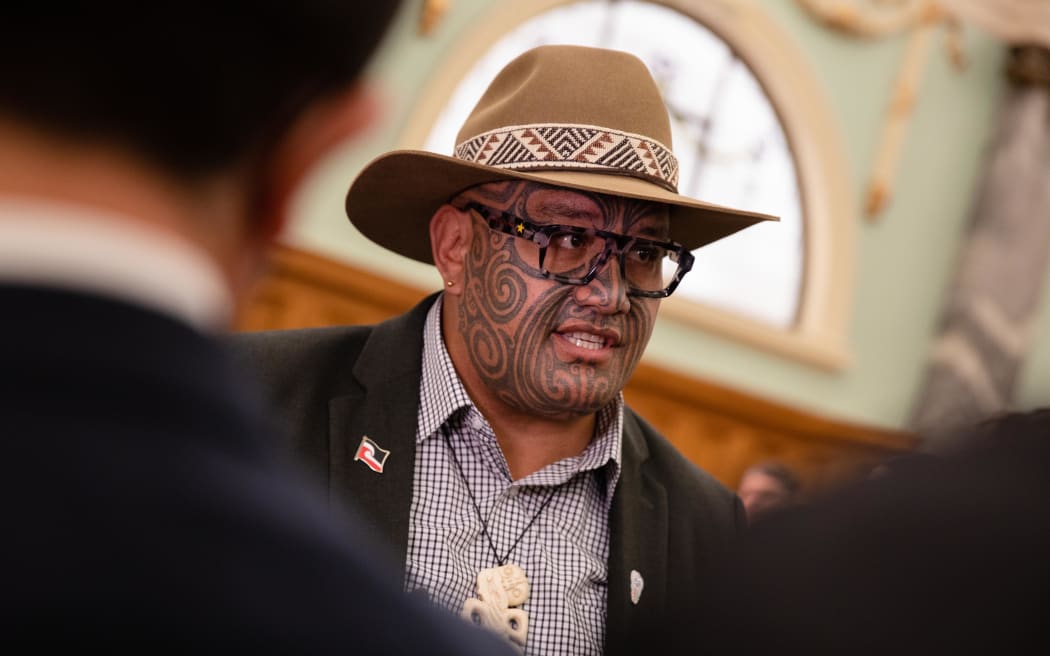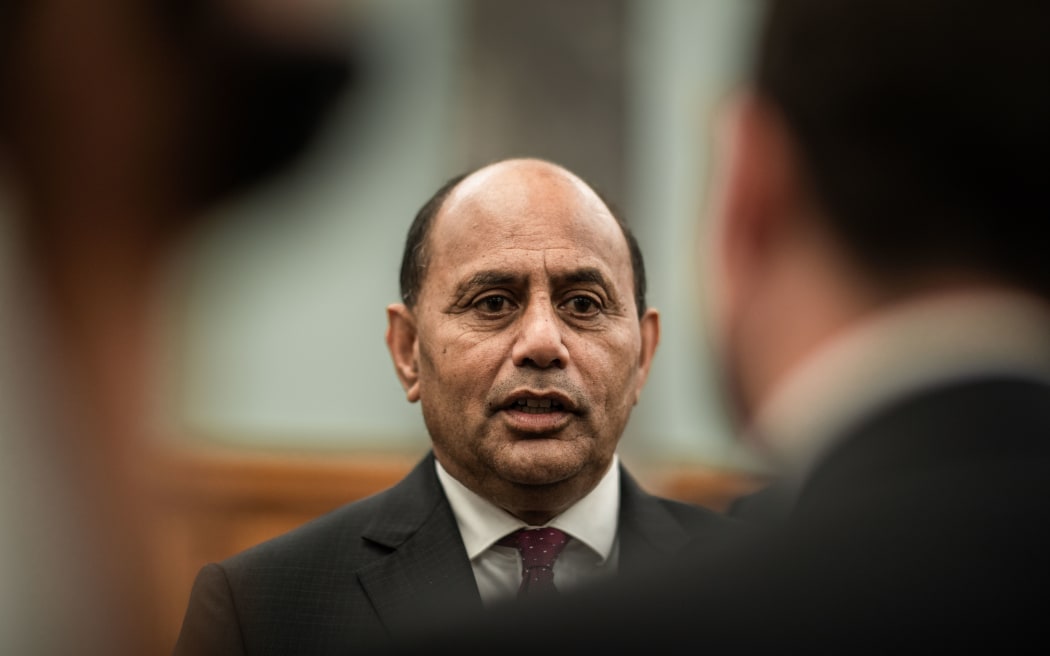"If we made an impulsive decision to become a republic tomorrow, then who is the Treaty relationship with?" - Te Matahiapo Safari Hynes
The death of Queen Elizabeth II has prompted an outpouring of grief, but has also revived discussion about New Zealand's ties to the monarchy.
That in turn has raised deeper ongoing questions over the nation's identity, its ties to Britain, and the key role of Māori and the Treaty in such discussions in future.

Photo: RNZ / AFP
Pomp and ceremony accompanied the formal change in monarch this week, the Queen's eldest son Charles immediately and automatically becoming King after her death. In New Zealand, Cabinet and the Executive Council met 48 hours later to formally acknowledge his accession, with the proclamation then read on the steps of Parliament to a crowd of hundreds with MPs and dignitaries dressed in black.
Such an historic event has not occurred for 70 years. The general consensus is it's too soon after the Queen's death to be talking about changes to New Zealand's constitution, but the event naturally provokes questions over the future.
Other Commonwealth countries have been grappling it with too: Antigua and Barbuda Prime Minister Gaston Browne confirmed the Caribbean nation will decide within three years whether to become a republic. It's had the opposite effect in Australia, with Prime Minister Anthony Albanese - despite earlier promises and having already created a Minister for the Republic - declared there would be no referendum on the matter in his first term.
On this side of the Tasman, former Prime Minister Sir Geoffrey Palmer, a constitutional expert, says if Australia becomes a republic, New Zealand will likely follow suit. While Aotearoa is a constitutional monarchy, he says it is already a "disguised republic": decision-makers are elected by voters, and the monarch rules from 18,000km away, at more than arm's length through the Governor-General.
"It seems to me very difficult if Australia becomes a Republic - as I think is very likely - for New Zealand not to become one, and the thing that people need to understand about that is that the Commonwealth connection is not affected. The majority of the Commonwealth nations are not ones who recognize the Queen or the King as Head of State."

Sir Geoffrey Palmer Photo: RNZ /Dom Thomas
The political neutrality embodied by Queen Elizabeth is, he says, of utmost importance to the Head of State role, but having a New Zealand citizen in the role is also the strongest argument for becoming a republic. As a symbol of unity and relatability, it could also help foster Aotearoa's national identity.
"The English traditions are not the same as ours. The imperial parliament at Westminster created New Zealand as a colony of the United Kingdom and that colonial legacy - while very important and positive in many respects - has quite a few weaknesses, especially when it came to the treatment of Māori by the early colonial governments, who really dispossessed Māori of a lot of land, and those scars are still with us.
"The process of decolonisation, or the shadow of it, is not yet quite complete in this country and I think you ought ... to be seen to be in charge of your own system."
He says a referendum and a Royal Commission would likely be necessary before such a change could be made, but it should not be hurried. It's unclear, too, where public sentiment lies.
Read more:
- Ardern in London to meet King Charles ahead of Queen's funeral
- Political panel: Monarchy, Covid policy, and Luxon's popularity
- Arrests of anti-monarchists prompt free-speech concerns
- Queen Elizabeth II walked a long road with Aotearoa New Zealand
- From Ngongotahā to Windsor Castle: When Matua Trev met the Queen
- What happens now to New Zealand’s coins and bank notes?
Parliament certainly wasn't in a rush - halted this week to mark the Queen's death, after speeches in the House to mark the event.
Prime Minister Jacinda Ardern has previously said she expects New Zealand will become a republic in her lifetime, but it's not on her government's agenda. Such talk of the inevitability of New Zealand becoming a republic has been going on for years, if not decades.
Green Party policy has long supported a referendum on becoming a republic, but co-leader Marama Davidson says it's too early to commit to that as a bottom-line for coalition negotiations. In her speech, Davidson referred to the Queen's "well-known utterance about the Treaty of Waitangi being 'imperfectly observed' in her words. She knew what she was a part of".
Te Pāti Māori co-leader Rawiri Waititi also raised the Crown's impact on Māori, reflecting on "the righteous anger of indigenous peoples all over the world and I take those stories, as stories that I carry with me".

Rawiri Waititi speaking to media at Parliament Photo: RNZ / Angus Dreaver
Waititi says the path is clear, and New Zealand as a nation just needs to be mature enough to have those conversations about the Crown and the Treaty of Waitangi.
"I'm sure we can all sit around the table as Tangata Whenua and Tangata Tiriti to look at ... how this document serves us all, because it gave consent for all of us to be here. And so Tiriti o Waitangi is not just about the rights of Māori, it's about the rights of everybody."
Māori views on the monarchy are far from unified. Aotearoa has already undergone enormous change since the Queen took the throne in 1952, the population increasingly diverse and with a constitution spread across multiple documents and pieces of law - but centred on the Treaty partnership between Māori and the Crown.
Labour Minister Peeni Henare says the debate should wait at least until iwi - and his in particular - have their Treaty settlements finalised.
"For me as a Ngāpuhi and the fact that we haven't come anywhere close to a settlement, there will be - at least from my perspective - no thoughts given towards a republic until ka whakamana-hia i te Tiriti o Waitangi - until it's been honoured."
Queen Elizabeth in 1995 offered a formal apology from the Crown to Waikato Tainui and signed the first Treaty settlement. Historian and Tainui leader Professor Tom Roa told told Midday Report he believes the Queen's apology was heartfelt - but a lot of thought needs to go into what a republic would mean for Māori.
"That apology from the reigning sovereign of a colonising nation to a colonised people had never ever occurred before and this significant event played a huge role in the recovery of our people from those ravages of colonisation."
Māori Development Minister Willie Jackson says many Māori respected that apology and offered huge support for the late Queen, in contrast to many of the activists who rallied against the Crown.

Photo: RNZ / Samuel Rillstone
"Māoridom is like Pākehādom I suppose, we're not all universally behind," Jackson says. "I think the reality for a lot of Māori is the position of the Treaty is paramount, and so there's been a lot of worry that the Treaty might disappear."
One rangatahi Māori, Te Matahiapo Safari Hynes was last year part of the Māori Constitutional Convention and has looked at how a constitution based in tikanga Māori and Te Tiriti o Waitangi could be implemented. He is one of those concerned about what impulsive calls for a republic would mean for Te Tiriti.
"If that is the space we are moving to, and if that is the thing that we want, then I want it to be a thing that is promulgated by us wanting to do it, I don't want us to only be doing something because someone has died.
"When we make that move, I want it to be because we wanted to; because we believe we've had enough discussions as a country, about the future of our country and where we're heading; because we all understand our history; because we all understand Te Tiriti o Waitangi; because we all understand the place of Māori and non-Māori.
"If we decide tomorrow that we're independent from the Crown, then who is being held to account for te Tiriti being abided by or breached? You know, there's just lots of things that we have to talk about, and that we need to discuss, before we jump onto these bigger ideas of 'let's just become a republic now, and everything will be great again'."
Sir Geoffrey however suggests the switch to a republic could be achieved without radically disrupting that relationship.
"Legally, the state of New Zealand inherits all the obligations of the Crown and that includes the Treaty, and of course the Queen has always had to - and so will Charles have to - act on the advice of the New Zealand ministers in that regard ... and in that sense nothing will change."
Hynes says conversations over where the country's heading, constitutional transformation and how Te Tiriti sits in that have already been happening for a long time. The challenge for the future is in giving space to everyone's voice while recognising what makes New Zealand unique - including the complexity and trauma associated with its colonisation.
In today's Focus on Politics podcast, RNZ Political Reporters Katie Scotcher, Anneke Smith and Giles Dexter explore what the debate about the role of the monarchy in New Zealand - and the possibility of change - could mean for its people.
Listen free to Focus on Politics on Apple Podcasts, on Spotify, on iHeart Radio or wherever you get your podcasts.




